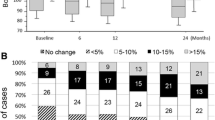Abstract
A clinical replication design was used with seven moderately obese women subjects to investigate the potential of a minimal intervention and problem-solving program in combination and separately. At the end of 1-year follow-up, clinically significant weight losses were achieved; three subjects (43%) reached their calculated ideal weight and the average weight loss was 25.31 pounds. Other major findings included the following: (a) Five subjects (71%) were able to lose weight during the minimal intervention program with little professional assistance; (b) homogeneous weight losses occurred during the problem-solving program (SD = 1.72) and measures of success in problem solving were significantly correlated with measures of weight loss; and (c) weight loss continued after treatment—six subjects (86%) lost weight at 3-month follow-up and three (43%) continued to lose weight at 12-month follow-up. It was concluded that the minimal intervention program might be used as an initial step in a stepped approach to weight management. Problem solving may be an important cognitive treatment component in behavioral weight control programs. Pounds lost may not be an accurate indication of the efficacy of a treatment program because asymptote can occur when a high proportion of subjects reach ideal weight, and therefore, percentage overweight should be considered the main dependent measure in weight-control studies.
Similar content being viewed by others
References
A to Z diet guide and calorie counter. (1977). North Miama Beach: Merit Publications.
Allsen, P. E., Harrison, J. M., & Vance, B. (1976).Fitness for life: An individualized approach. Dubuque, Iowa: William C. Brown.
Black, D. R. (1978).Problem-solving skills for weight control. Unpublished manuscript. (Available from Health Promotion, Purdue University, 106b Lambert/PEHRS, West Lafayette, IN 47907)
Black, D. R., Coe, W. C., Friesen, J. G., & Wurzmann, A. G. (1984). A minimal intervention for weight control: A cost-effective alternative.Addictive Behaviors, 9 279–285.
Black, D. R., & Friesen, J. G. (1983). Deposit money: A component in a self-directed minimal intervention program for weight control.Behavior Therapy, 14 333–340.
Black, D. R., Hyner, G. C., Melby, C. L., & Hovell, M. F. (1985, May).The Purdue Model
Black, D. R., Hyner, G. C., Melby, C. L., & Hovell, M. F. (1985). The Purdue Model of Health Promotion and Disease Prevention: Implications for treatment and evaluation.Journal of American College Health, 34 85.
Black, D. R., & Kooyers, K. J. (1986). A meta-analytic approach to couples weight loss programs. Manuscript submitted for publication.
Black, D. R., & Scherba, D. S. (1983). Contracting to problem-solve versus contracting to practice behavioral weight loss skills.Behavior Therapy 14 100–109.
Black, D. R., & Threlfall, W. E. (1986). A stepped approach to weight control: A minimal intervention and a bibliotherapy problem-solving program.Behavior Therapy, 17 144–157.
Bower, C. P., Padia, W. L., & Glass, G. V. (1974).TMS: Two Fortran IV programs for the analysis of time-series experiments. Boulder: University of Colorado.
Cooke, C. J., & Meyers, A. (1980). The role of predictor variables in the behavioral treatment of obesity.Behavioral Assessment, 2 59–69.
Dubbert, P. M., & Wilson, G. T. (1984). Goal-setting and spouse involvement in the treatment of obesity.Behaviour Research and Therapy, 22 227–242.
D'Zurilla, T. J. (1986).Problem solving: A social compretence approach to clinical intervention. New York: Springer.
Ferguson, J. M. (1975).Learning to eat: Behavior modification for weight control. Palo Alto, California: Bull Publishing.
Foreyt, J. P., Mitchell, R. E., Garner, D. T., Gee, M., Scott, L. W., & Gotto, A. M. (1982). Behavioral treatment of obesity: Results and limitations.Behavior Therapy, 13 153–161.
Glass, G. V., Willson, J. L., & Gottman, J. M. (1975).Design and analysis of time series experiments. Boulder: Colorado Associated University Press.
Hubert, H. B., Feinlieb, M., McNamara, P. M., & Castelli, W. P. (1983). Obesity as an independent risk factor for cardiovascular disease: A 26-year follow-up for participants in the Framingham heart study.Behavior Medicine, 67 968–977.
Jeffery, R. W., & Wing, R. R. (1979). Frequency of therapist contact in the treatment of obesity.Behavior Therapy, 10 186–192.
Kazdin, A. E. (1982).Single-case research designs: Methods for clinical and applied settings. New York: Oxford University Press.
Mahoney, M. J., & Mahoney, K. (1976).Permanent weight control. New York: W. W. Norton.
McNemar, Q. (1969).Psychological statistics (4th ed.). New York: Wiley.
Nutrition and health: Eating well may mean staying well. (1976, Summer).Palo Alto Medical Clinic News.
Pennwalt Prescription Products. (1977).Are you really serious about losing weight? (10th ed.). Author.
Rogers, T., Mahoney, M. J., Mahoney, B. K., Straw, M. K., & Kenigsberg, M. I. (1980). Clinical assessment of obesity: An empirical evaluation of diverse techniques.Behavioral Assessment, 3 161–181.
Slochower, J. A. (1983).Excessive eating: The role of emotions and environment (Vol. 3). New York: Human Sciences Press.
Strossen, R. J., Coates, T. J., & Thoresen, C. E. (1977). Extending generalizability theory to single subject research.Behavior Therapy, 10 606–614.
Stuart, R. B., Mitchell, C., & Jensen, J. A. (1981). Therapeutic options in the management of obesity. In L. A. Bradley & C. K. Prokop (Eds.),Medical psychology: A new perspective. New York: Academic Press.
Wilson, G. T. (1980). Behavior therapy for obesity. In A. J. Stunkard (Ed.),Obesity. Philadelphia: Saunders.
Wilson, G. T., & Brownell, K. D. (1980). Behavior therapy for obesity: An evaluation of treatment outcome.Advances in Behaviour Research and Therapy, 3 49–86.
Author information
Authors and Affiliations
Additional information
This research was supported in part by a grant from the Academic Computing and Advisory Committee at the University of Nebraska Medical Center, Omaha. I wish to thank the following people for their help and suggestions: Elaine Baskin, J. Merrill Carlsmith, Richard N. Jacks, Joyce Nash, and Nicholas G. Stayrook. I thank the following people for their review of earlier drafts of this manuscript: William C. Coe, Thomas J. D'Zurilla, Ronald S. Hadsall, Robert W. Jeffery, Mark E. McKinney, Michael H. Miner, Judith L. Timberg, Carl E. Thoresen, and Rena R. Wing.
Rights and permissions
About this article
Cite this article
Black, D.R. A minimal intervention program and a problem-solving program for weight control. Cogn Ther Res 11, 107–119 (1987). https://doi.org/10.1007/BF01183136
Issue Date:
DOI: https://doi.org/10.1007/BF01183136




